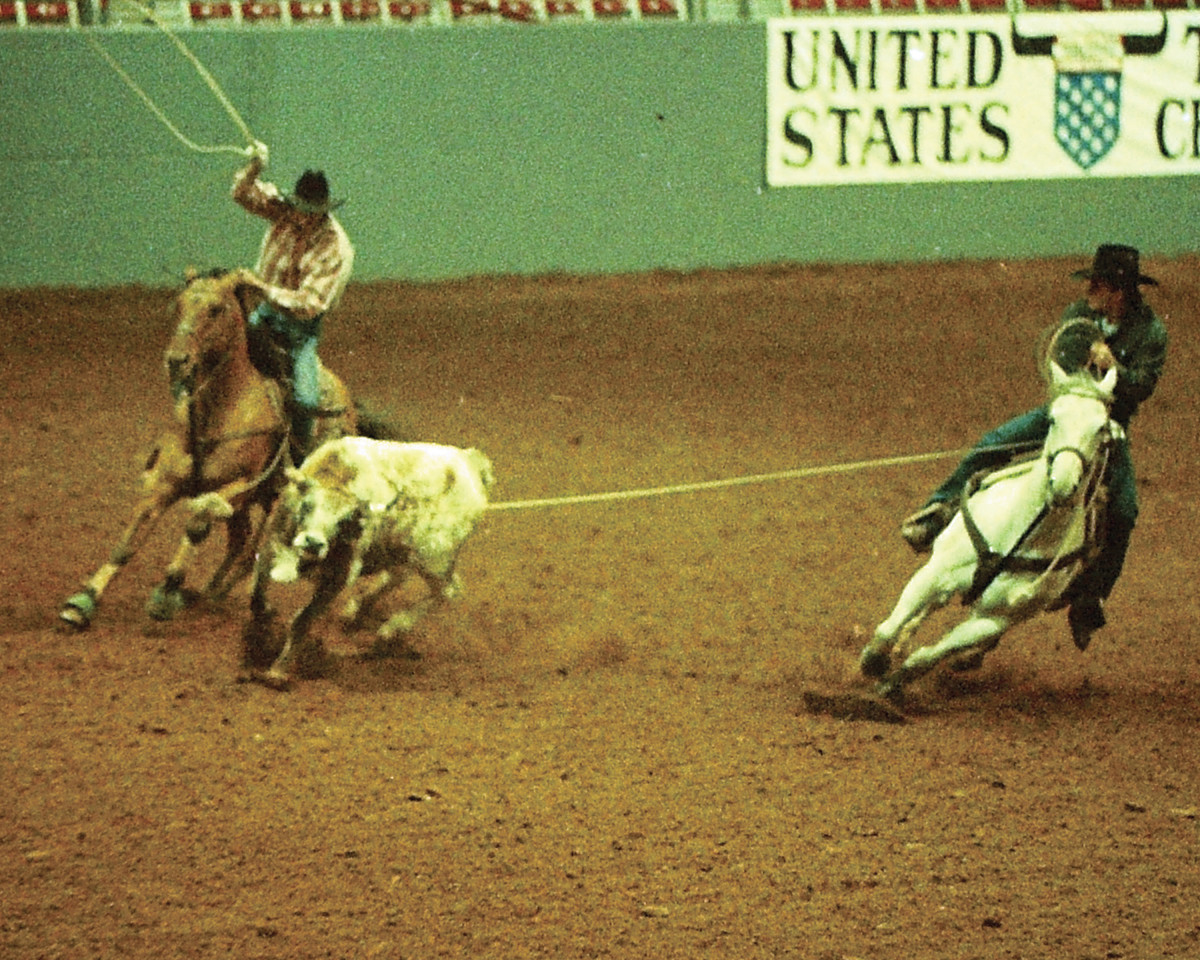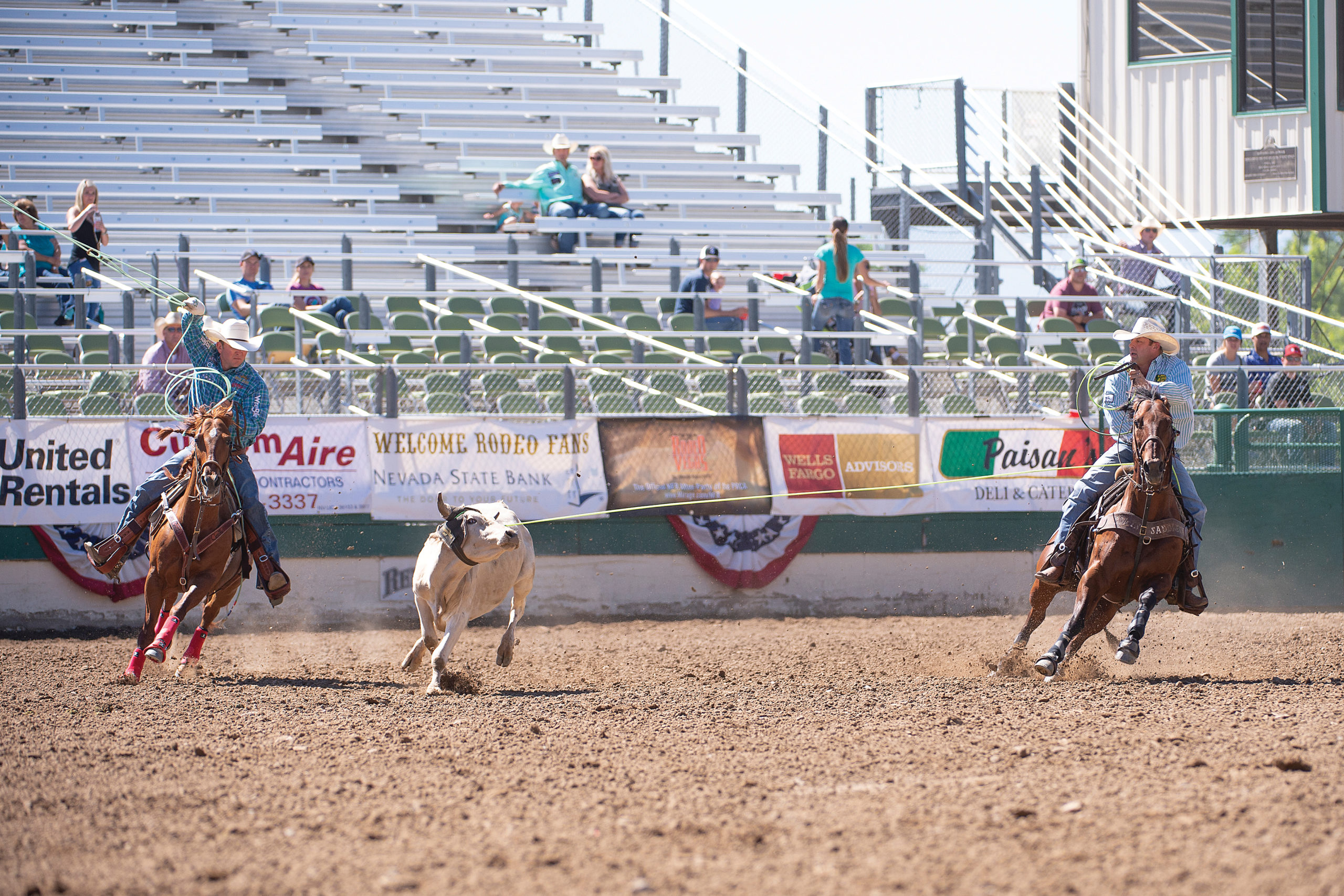Charles Pogue’s iconic Scooter makes everyone’s greatest head horses of all time short list. Oklahoma Top Hat’s record six American Quarter Horse Association/Professional Rodeo Cowboys Association Head Horse of the Year awards—as voted on by Pogue’s world-class team roping peers—is far from all he achieved in his career. In 2000, Pogue won both the Wrangler National Finals Rodeo and BFI on his dream horse, who died while still in his prime at 17 the following summer. Scooter was a four-legged wonder, and his longevity was legendary.
Listen: The Story of Charles Pogue’s Legendary Scooter on The Score Podcast
“Scooter was 6 when I bought him in 1990,” said 15-time NFR header Pogue, who’s pretty sure he rode Scooter at nine of them. “A guy named Vollie Wingo had Scooter at a local jackpot. He was a lot of horse, and Vollie asked my dad if he’d help him with him. My dad told me I needed to get home to try him.
“He didn’t face great when I got him, but I placed on Scooter as soon as I started hauling him. I could already tell he was going to let me win, and it didn’t take long to get him finished.”
Scooter was the Head Horse of the Year in 1991, ’92, ’93, ’97, ’98 and ’99. Pogue, who was the 1987 PRCA Resistol Rookie Header of the Year, won the 1988 NFR average with Rickey Green riding his horse Wasp, and the 2000 NFR average with Britt Bockius aboard Scooter. Charles and Scooter won the BFI three times together—in 1991 with Steve Northcott, and in 1999 and 2000 with Bockius. Pogue won the USTRC Open on Scooter four times, and most major rodeos—Salinas, Houston, San Antonio and Reno included, and many more than once.
“Scooter’s longevity is part of what made him great,” Charles said. “I rode him in every kind of set-up, but I didn’t ride him everywhere. My wife (Londa) helped me take great care of Scooter, and I gave him a lot of breaks along the way to try and keep him fresh and ready to go for the summer.
“I had a (sorrel) horse I called Cowboy for a good part of Scooter’s career, which really helped. A lot of years, I left Scooter home when I went to California for the spring run. And I didn’t ride him at the smaller ropings. My dad always told me that horses only have so many runs in them, so I tried to limit Scooter’s runs when I could.”

Brenda Allen photo
Scooter was 15.1 hands, and weighed right at 1,200 pounds.
“We had Scooter’s hocks injected sometimes, but not routinely,” Charles said. “He got a little sore, so we put wedges on his front feet the second half of his career. Scooter had some quirks, like kicking the trailer. But Bobby Hurley showed me the trick of slipping horseshoes around the back of his ankles that helped stop that.
“A lot of keeping Scooter sound was just trying to keep him really fit. I didn’t practice on him much, but he got loped a mile and we made sure he stayed in good condition. He didn’t come back from layoffs without being legged up really good.”
They also hauled him with care, including driving at night during the hot months.
“We definitely tried to travel when it was cooler,” Charles said. “And when it was hot, we kept water in front of our horses as much as possible. We kept good shavings in there, and broke up the drives by getting them out of that trailer pretty regularly.”
Scooter had surgery on his right rear ankle in Littleton, Colorado in the mid-90s. Besides that, it was pretty smooth sailing on the soundness front.
At 17, pneumonia cut Scooter’s life and career short. It was heartbreaking, but somehow fitting that Charles got the dreaded call that his dream ride died the day of the 2001 BFI.
“Scooter got sick coming home from Logandale (Nevada, that spring),” Charles said. “His nose was draining and he just wasn’t feeling good when we got home, so he stayed with a vet in Oklahoma City about a month with drain tubes on his lungs. When we brought him home, I figured he was done. By then, I just hoped we could get him well enough for us to retire him at the house.
“Scooter started losing weight. So when we had to leave for the summer, we left him with the vet to give him every possible chance. But his lungs kept filling back up with fluid, and he just couldn’t kick it. We had a little time to prepare for it, but losing Scooter while he was still in his prime was a pretty tough loss. There will never be another horse quite like Scooter.”






